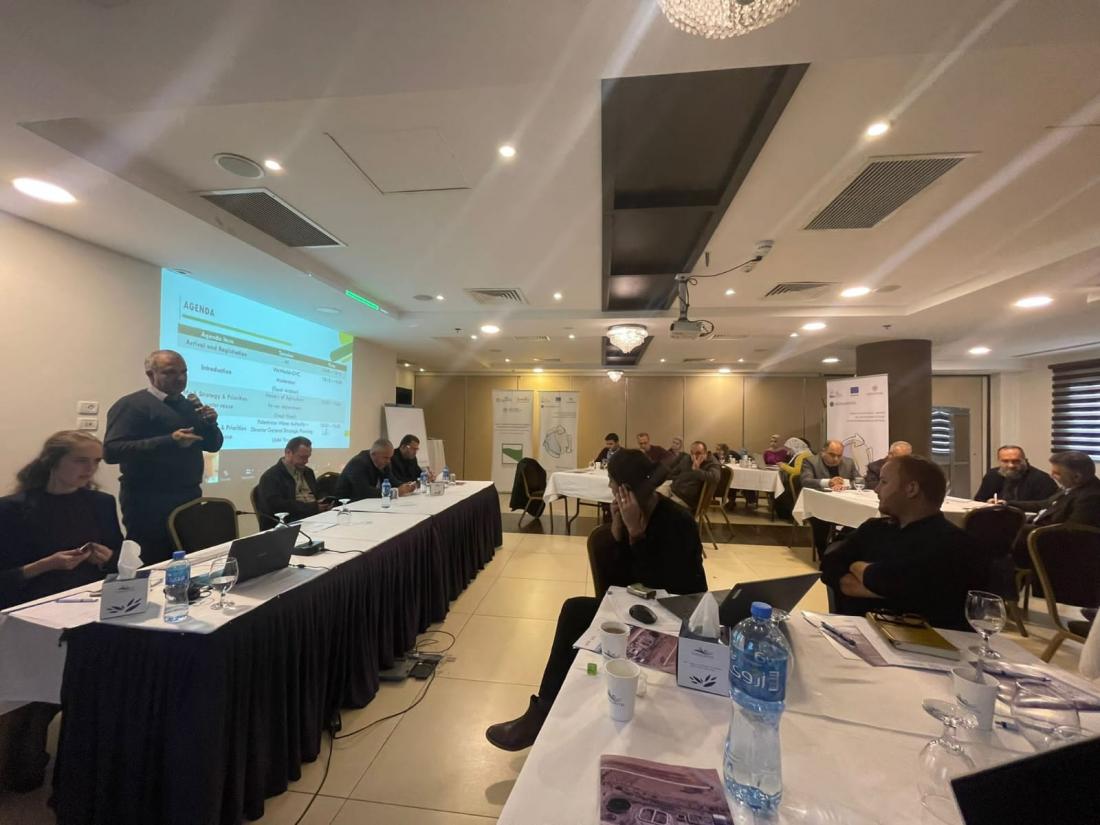MENAWARA partners highlight the importance of cooperation on promoting the re-use of treated waste water

On December 15th, MENAWARA and WeWorld GVC hosted an international roundtable in Ramallah focusing on the "Re-Use of Treated Waste Water in Agriculture", to share "Lessons learned and recommendations from Palestine" and discuss the road ahead.
The MENAWARA project's impact was presented and discussed with international partners and local authorities.
The Ministry of Agriculture, Palestinian Water Authority, the Village Council of Beit Dajan participated actively in the meeting, acknowledging the value of MENAWARA initiative, outlining the general strategies on water quality in the local and regional context, as well as initiatives to tackle the lack of expertise in the field of treated waste water.
Environmental sustainability encompasses multiple issues, from the environmental impact of the occupation to the reduction of waste. We need to focus on an integrated approach beyond sectorial interventions: protection, sanitation, education, advocacy community building are all intertwined. A territorial approach is necessary to tackle all these aspects simultaneously with the contribution of all stakeholders.
As 85% of underground water resources are under Israeli control
in the West Bank it is necessary to address the cause rather than the symptoms. The issue is not financial access, but lack of access to basic services and resources. The change needed is in terms of narrative, rather than solely in technological innovation. We need to work together and actively engage donors, diplomatic missions and other stakeholders to advocate for this purpose.
The discussion tackled the need for adequate legislation to establish what kinds of secondary water resources, including desalinised waters, can be used for a variety of purposes considering the ever increasing demand.
The area of intervention of Beit Dajan, 10 km east of Nablus city, lies at the edge of the Jordan Valley. The village’s agricultural lands are cultivated with olives, almonds, grapes and lemons. The quality of the treated waters is not suitable for a variety of uses.
MENAWARA interventions resulting in the development of a complementary irrigation system have demonstrated the potential of improved treated water on the fields allowing an increase in yields and the opening of new markets for interested farmers.
Thanks to the one year extension, we will be able to assess the impact on crops and carry out training activities, south south exchanges among farmers, international roundtables such as the one we had today, to gather and disseminate recommendations and lessons learnt in order to replicate this kind of action not only in Palestine but also in other Mediterranean countries.
Project partners reiterated the Main objectives of the Menawara project, such as:
- Improving water use efficiency of non conventional water for irrigation
- Strengthening the non conventional water governance at local and national level by disseminating and capitalizing on innovative technological solutions.
- Focus on continuity and capacity building of operators and farmers on operation and maintenance
- Living labs as an innovative approach which has the potential to become mainstream. The approach brings all stakeholders together, from farmers to the Water User association to local residents as an educational tool for the neighboring villages.
They also discussed future goals and activities: first of all the development and drafting of a Memorandum of Understanding (MoU) between the farmers and the village council of Beit Dajan on the quality the Waste Water Treatment Plant will provide. Participants remarked the importance of disseminating quality information for the general public at local level, for example with the production of an informative booklet and a practical guide for farmers on safe re-use, as well as combining field experiments and modeling for a no harm irrigation management with treated waste water, and finally, promoting and disseminating practical trainings and success stories.







